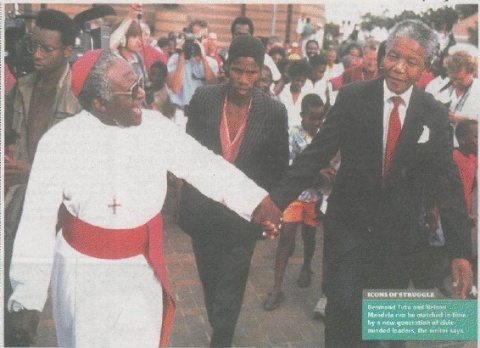I had the good fortune of being in America at the time of President Obama’s inauguration. It was a time of high hopes and intense optimism. During my travels I came across a quote from Obama’s Harvard Law School professor Christopher Edley Jr. that made a significant impression on me.
“So the first generation comes through, and they say great, you get your law degree and you go out and you be a troublemaker in the black community. Second wave comes through, and aha, now I’ve got opportunities in business. Third wave comes through, and maybe we’ve gotten to the point where we can get somewhere with mainstream politics, not protest politics.”
The quote is obviously related to the Civil Rights Movement, which began to win freedoms for America’s minority black community in the 1960s, but it seemed to me to offer hopeful parallels for South Africa where there is much noise about a leadership crisis. Many despair that we won’t ever again know leaders of the calibre of Nelson Mandela (who did indeed get his law degree and start causing trouble) and Archbishop Tutu. All around me I hear people asking with urgency, “Where will our leaders come from?”
As I reflect on this quote, it seems clear to me that these icons, and many others like them, were South Africa’s first wave of activist leaders who won freedom in the 1990’s. They opened the doors of opportunity for the second wave, many of whom have rushed to the feeding trough that business and politics are perceived to be. It is understandable that some are discouraged that the children of yesterday’s activists are today’s tenderpreneurs and Mercedes-driving politicians, but there is another generation who is coming up behind them.
These are young people who have used the opportunities afforded them to get good education first and foremost. Secondly, like President Obama, they are choosing to use their education to assist others. They are considering public service and other avenues where they can make a difference.
In this regard, I wonder if we are not 30 years behind the United States and will only truly see this third wave emerge in full force when they are midcareer, about 25 years from now. I know that this third wave is gathering momentum because I work alongside these young 20 year olds every day at the Tertiary School in Business Administration (TSiBA). Many lament the quality of education in South Africa, but when I go to inter-university events, it is strikingly clear that the demographic profile of university students has changed dramatically.
In an attempt to share the optimism that I gleaned from my travels in the States, I initiated a book called The Search for Tomorrow’s Leaders and set out to interview others who, like my colleagues and I, are hard at work developing tomorrow’s high profile leaders. I wanted to challenge the belief that there is a leadership crisis by profiling the third wave that is emerging. I wanted to learn what others who work in leadership development know because I am convinced that South Africa is rich in many kinds of positive leadership, at all levels in our society.
Indeed, iconic and positive leadership has been one of the gifts that our country has offered to the world. As a nation we know something about the journeys that lead to significant leadership and what it takes to develop this.
My team and I interviewed university Vice-Chancellors and high school principals, politicians and business people, activists and social entrepreneurs. Some were well-known names like Jonathan Jansen and Ferial Hafajee. Most were ordinary South Africans who have committed themselves to nurturing our country’s next generation.
Although we set out to interview “thought leaders”, we quickly started to think of our interviewees as “thought and action leaders” for indeed this was one of our most fascinating findings. We were surprised to learn that even the most well-established leaders did not think of themselves as leaders. Or, if they did, it was a recent and still somewhat uncomfortable change in their sense of identity. None of the people that we interviewed set out to be leaders. Instead, they repeatedly described seeing a need and rising to the challenge.
We came to realise that perhaps a more accurate description of leadership is people who are willing to take action to address the challenges that they see around them. You don’t need to be a politician to be a leader, and this is the point that Mamphela Ramphele’s Citizen’s Movement for Social Change is trying to make. We need to stop thinking of ourselves as subjects who are at the behest of our “leaders” and start becoming active citizens.
Our book is filled with examples of South Africans who are doing just that. They may not think of themselves as leaders but they are, and once we began looking for them we were amazed to find how many reasons there are for hope. Indeed everyone who works in the field of leadership development describes how hopeful they are.
Perspectives: The Search for Tomorrow’s Leaders seeks to put paid to the despair that I sense when people talk about “leadership” and “youth”. It may be that we are feeling the full effects of the second wave in South Africa, but behind them another wave is gathering momentum. These educated and ethical leaders, who are deeply committed to our country, are slowly entering the mainstream.
Get your copy of Perspectives at the Book Lounge in Roeland Street, and read interview about IkamvaYouth which is featured in the book on the DGMT site.


 Lloyd Lungu
Lloyd Lungu